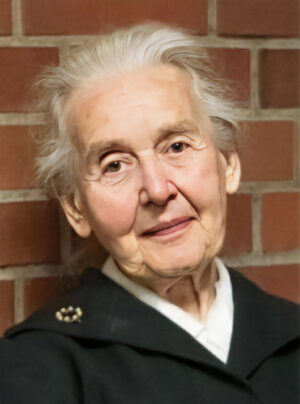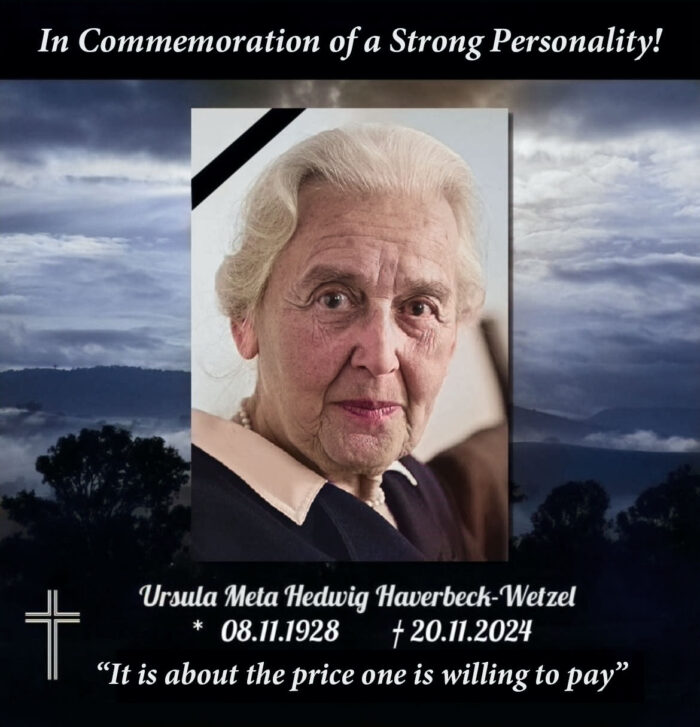Ursula Haverbeck in Memoriam – 8 Nov. 1928 – 20 Nov. 2024
Profiles in History
It may sound weird today, but back in 1989, when I first joined the ranks of revisionist researchers by reading the Leuchter Report, I felt like I was late to the game. Seasoned revisionists such as Dr. Robert Faurisson, Dr. Wilhelm Stäglich and Dr. Arthur Butz had done trail-blazing work in the 1970s, as I learned later, and the Second Zündel Trial, with its revolutionary Leuchter Report, was already a year in the past. So, what more could I contribute? Well, the Leuchter Report left more questions open than it answered for me. One of them was: is the legendary Prussian Blue that Leuchter was looking for with his chemical analyses of wall samples taken at Auschwitz really durable enough to survive 40+ years of environmental exposure? If it wasn’t, there was no point in taking samples, let alone analyzing them.
A year later, in October 1990, I moved to Stuttgart to start my PhD position at the local Max Planck Institute for Solid State Research. That institute had all the resources I needed to answer this question. Hence, in my spare time in the evenings, I set out to find the answer in the institute’s science library. Around that time, I made the acquaintance of Klaus Ewald, who lived in Weilimdorf, a Stuttgart suburb. At that time, he was in the process of translating Ernst Zündel’s book The Holocaust on Trial into German (using the pen name Pia Causa). When I told him in early 1991 that I had discovered some interesting research on the long-term durability of Prussian Blue, he gave me a list of names and addresses of individuals who he thought might be interested in my ongoing research and its results. Unbeknownst to me, among the names was a friend of retired Major General Otto Ernst Remer, which would have long-term consequences for my life. But that strand of my biography I have told elsewhere already. Another name on that list is more to the point: Historian Professor Dr. Werner Georg Haverbeck, husband of Dr. Ursula Haverbeck. He was not the only historian on that list, but he and his wife embraced and welcomed my research with the most enthusiasm and encouragement among them all.

During those early years of my revisionist engagement, I was welcomed into the Haverbeck home a couple of times, and I very much enjoyed their generous hospitality. A year later, when I mailed the first version of my expert report on Auschwitz to an extended list of interested individuals, Prof. Haverbeck was one of the recipients. A short while after having sent out my report, he responded as follows in a letter dated January 31, 1992:
“For me, the significance of receiving your report rests on the fact that it substantially contributes to our stock of knowledge. With many of my colleagues active in the field of contemporary history, I am overjoyed and thankful for you having initiated this research activity. Of course, I am even more delighted regarding the results of your accurate scientific investigation.”
Sadly, Prof. Haverbeck passed away too early, just seven years later. His wife Ursula, who had been his right-hand woman since the mid-1960s, continued his legacy. In 2003, she volunteered to be the deputy chairwoman of the newly established “Association for the Rehabilitation of those Persecuted for Contesting the Holocaust” (Verein zur Rehabilitierung der wegen Bestreitens des Holocaust Verfolgten), which featured among its founders many of the big shots of revisionism – among them Dr. Robert Faurisson, Jürgen Graf, Wilhelm Stäglich, Dr. Fredrick Toben, Ernst Zündel and me, to name but a few. That human-rights organization was outlawed and dissolved by the German authorities in 2008, and so was Dr. Haverbeck’s Collegium Humanum (subtitled Academy of Environment and Life Protection), which she had established together with her husband in 1963, and whose home was used by the Association as a logistical center.
Ursula Haverbeck wasn’t one to go away, though. And she wasn’t just repeating what others had told her about the Holocaust either, be they orthodox or revisionist in nature. In 2015, the leftist German TV program Panorama conducted a long interview with her. During that interview, she showed and quoted from a book that had appeared some 15 years earlier, whose title translates to: Commander’s and Headquarter’s Orders in the Concentration Camp Auschwitz (in German; amzn.com/dp/3598240309). She insisted that the orders issued by the Auschwitz camp authorities fly in the face of extermination claims, and she gave a few stunning examples. In reaction to this interview, the editor of this book, German historian Dr. Norbert Frei, claimed that Haverbeck distorted and misrepresented his collection of documents.
This interview was only the tip of the iceberg of Dr. Haverbeck’s continued challenges to the orthodox Holocaust narrative, which led to a never-ending deluge of criminal proceedings, eventually resulting in her having to spend time in prison. The history of her persecution is too long to be recounted here. The inclined reader can read the details on the Wikipedia page dedicated to her. If I counted correctly, she accumulated a total of three and a half years of prison time by the time she passed away, with more still pending to come.
When I learned in 2015 about her TV stunt, which gave revisionism a massive public presence in Germany, I was stunned by her presentation of this book by Dr. Frei, which I could not remember ever having heard of. When I dug into my material, I realized that Carlo Mattogno had quoted from that book for years in his many studies on Auschwitz, and that I had been translating and editing his respective footnotes. For some reason, however, the book had completely evaded my attention. I decided right there and then – and announced that decision publicly – to publish a new book, as part of our series Holocaust Handbooks, that would analyze Dr. Frei’s book and give a fair presentation of its contents, as well as a critique of Dr. Frei’s misrepresentations. Unfortunately, my domestic situation did not allow me to realize this project for many years. It took the initiative of a reader and supporter of mine to get the project going. The book appeared finally in 2020 as Volume 34 of the series, and its preface recounts in detail the background of how this book came to be: Garrison and Headquarters Orders of the Auschwitz Concentration Camp.
Ursula Haverbeck was eventually sentenced to ten months imprisonment for her interview. However, nothing the German authorities did to her could stop her from speaking her mind, always with a respectful tone of voice, good manners and an academic style. She was a true lioness who would not stop roaring at those depriving her and her entire people of the right to freely investigate her nation’s history.
Volume 34 of our series should be counted as part of her legacy. Without her interview and sacrifice, it would not exist.

PS: In the mid-1990s, when I got into the crosshairs of the German persecutorial system, my mother got ragingly mad at a long list of academics who had encouraged me to embark on my revisionist journey to publish my and other researchers’ results, while they themselves could not muster the courage to take a public stance on the matter to defend me, when things got hot. The Haverbecks, however, were not among those pussyfoots who would send me into the fire while taking cover in the trenches. They were out there with me, bravely facing the bullets of government persecution. This is particularly true for Ursula.
Ironically, former revisionist Eric Hunt accused me (shortly after his renunciation of revisionism in early 2017), that my actions were irresponsible because they could get people like him in trouble, and send naïve old ladies to prison (hinting at Mrs. Haverbeck, then being dragged through court), while I was allegedly hiding in safety in the U.S. But it was actually the other way around: if anything, the Haverbecks and others instigated me to start on this revisionist journey. But I am man enough to take responsibility for my own actions. I won’t blame others for my life’s decisions. And neither did it ever cross Dr. Ursula Haverbeck’s mind to blame others for the decisions she made. That’s another hallmark of a truly great personality.
Bibliographic information about this document: Inconvenient History, 2024, Vol. 16, No. 4
Other contributors to this document:
Editor’s comments:
